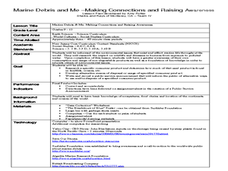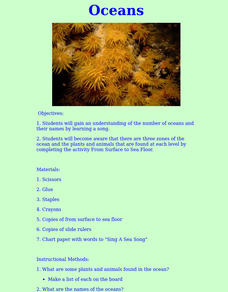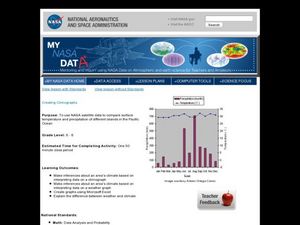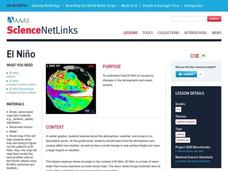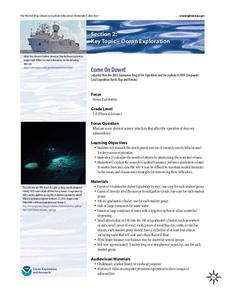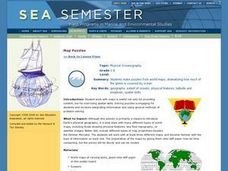Curated OER
Marine Debris and Me
Students study the environmental issues that pertain to the marine environment. In this research ocean landfills lesson students come up with alternative means of disposal.
Curated OER
Clam Hooping
Students explore ocean biology by capturing organisms on a beach. In this clam collecting lesson plan, students identify the clam species and discuss the anatomy of a clam as well as the importance they provide as a meal. Students...
Curated OER
Oceans
Students gain an understanding of the number of oceans and their names by learning a song. They become aware that there are three zones of the ocean and explore the plants and animals that are found at each level.
NOAA
What's New?
Biodiversity in some areas is more diverse than one might think. Using a two-day lesson, pupils consider the biodiversity of the Hudson Canyon and the characteristics of one organism. They begin with an analysis of the common earthworm...
Curated OER
Creating Climographs
Students use satellite data to compare precipitation and surface temperatures on different islands. In this satellite lesson plan students create graphs and explain the differences between weather and climate.
Curated OER
Bioluminescence 2009: Living Light on the Deep Sea Floor Expedition - Now You See Me, Now You Don't
Students examine bioluminescence and camouflage of deep sea creatures. In this deep sea creatures lesson, students investigate the visible and near-visible light spectrum. They work in small groups to complete a light, color, and...
Curated OER
Ocean Habitats:
Students investigate the creatures of intertidal zones. They explore the adaptations species make to survive .
Curated OER
Ocean Exploration
Students explore whales. In this animal adaptation and whale activity, students access prior knowledge about whales from previous lessons, then use background knowledge to predict the eating strategies of a baleen whale and a toothed...
Curated OER
Oceans of Fun
Here is a great hands-on activity that should lead to a greater understanding of salt water, why the ocean is salty, and how ocean waves are formed. This terrific, old-school lesson has clearly described activities, and all of the...
Curated OER
Underwater Mountains & Trenches
Students determine Earth's deepest trench, outline continents, major ocean mountains, and trenches on color-key map using Crayola Erasable Colored Pencils, identify oceans' geographic features, locate significant oceanic features around...
Curated OER
El Nino
Explore the properties of water and the affects of El Nino. Middle schoolers will learn about the devastation an El Nino can cause as well as the definition of El Nino. Additionally, they will discover the cause of El Nino along with the...
Curated OER
How Does Your Garden Grow? Discovering How Weather Patterns Affect Natural Cycles
For the warm-up in this cool climate lesson, you will need to click on "Mapping" and then "US Mapping" once you arrive at NOAA's "US Climate at a Glance" page. Earth science explorers realize that 2012 was a warm winter for us. They read...
Curated OER
Animals of the Lost City
Begin with a demonstration of exothermic reactions and discussion of chemosynthesis. Your aspiring oceanographers research vent communities and then craft a mural of a vent community. This is a terrific method of introducing learners to...
Curated OER
It's a Gas! Or is it?
Examine the effects of temperature and pressure on solubility and the states of matter of ocean water. Learners make inferences about the unique chemistry of ocean water at different depths. They engage in an activity related to...
Polar Trec
Down to the Deep Virtual Lab
At a depth of 3,000 m in the ocean, the pressure is 300 times that at sea level! In the activity, individuals predict what will happen to Styrofoam cups submerged 3,000 meters into the ocean. They then convert these units to soccer...
NOAA
Come on Down!
What do we do when a dive is too dangerous for humans to accomplish? Send in the robots! Middle school scientists get acquainted with several different models of submersible robots in the second lesson plan of six from NOAA. Lab groups...
NOAA
What's the Big Deal?
Who knew that a possible answer to Earth's energy resource problems was lurking deep beneath the ocean's surface? Part four of a six-part series introduces Earth Science pupils to methane hydrate, a waste product of methanogens. After...
Curated OER
Should the Ming End the Treasure Voyages?
During the first century of Chinese Ming dynasty (1368-1644), the government sent out a total of seven voyages into the Indian Ocean. Young historians will discuss, explain, role play, and compare the decisions made by rulers during the...
Curated OER
Map Puzzles
Young scholars make puzzles from world maps, dramatizing how much of the globe is covered by ocean.
Curated OER
Sand Shakes & Mud Pies: Investigating Sediment
Take a field trip to a location where water and land meet to study patterns of sediment organization in wet habitats: river or ocean beaches, sand dunes, tidal marshes, the edge of a pond, or a woodland stream. Small groups collect pairs...
BBC
Rivers
The water cycle, rainfall, and the flow of water into rivers then out into the ocean are the main ideas covered here. After a teacher-led discussion and activity, learners pair off and write a commentary about the water cycle that is to...
Curated OER
Classifying Deep-Sea Organisms
Young scientists access the EARTH Web site in order to engage in this lesson life forms found in the ocean. Student groups of 3 - 4 choose one set of deep-sea organism images. The groups decide how they would classify their organisms and...
Curated OER
It's a Gas! Or is it?
Oceanography enthusiasts are given a series of thought experiments to consider in order to relate the solubility of gases and solids to underwater volcanoes. It is not particularly engaging to perform these thought experiments. Choose...
Curated OER
Microscopic Water Life
Students use a light microscope to observe the organisms living in a sample of ocean or fresh water. Students create a drawing of the organisms that they observe. Students then discuss the different body plans of the organisms and the...
Other popular searches
- Oceans
- Oceanography
- Continents and Oceans
- Ocean Currents
- Ocean Mammals
- Ocean Food Chain
- Ocean Explorers
- Ocean Animal Adaptations
- Continents Oceans
- Oceans and Seas
- Ocean Floor
- Oceanography Science
